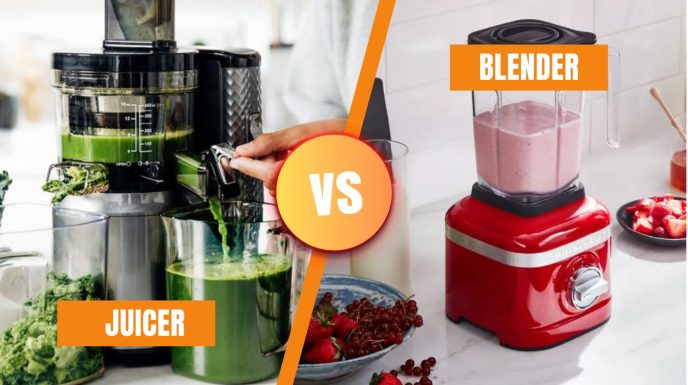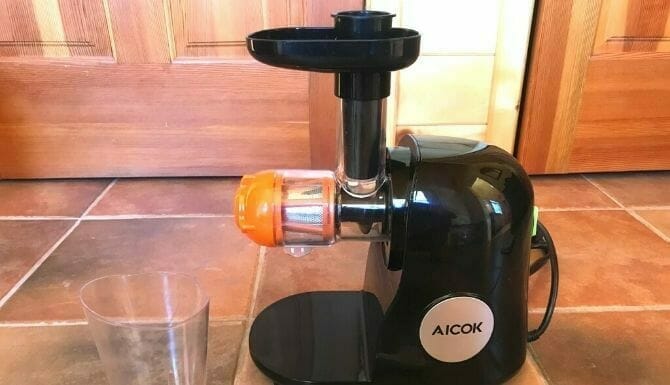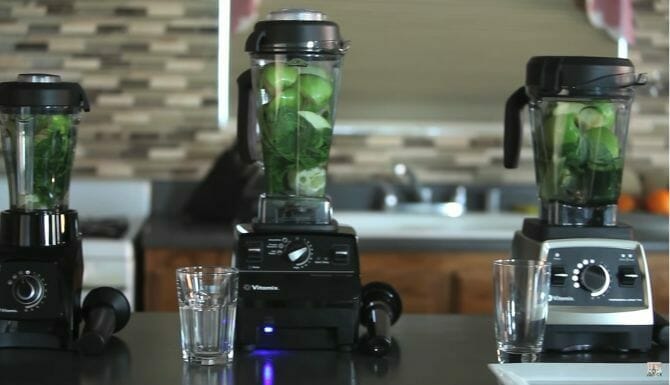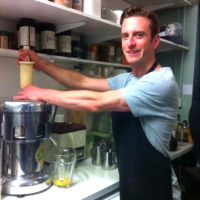A juicer is a device used to extract juice from fruits and vegetables. A blender is a device used to create smoothies, soups, and other textured foods by blending different types of ingredients. The two devices have different purposes, and so they are not interchangeable. A juicer is designed to extract juice from whole fruits and vegetables. In contrast, a blender is designed to mix ingredients. Blenders are also not as efficient at extracting juices as juicers are. Both have different characteristics and differences. Below we will discuss in detail what’s the difference between a juicer and a blender.
The difference Between a Juicer And a Blender

Here is a table that summarizes the key differences between juicers and blenders:
| Feature | Juicer | Blender |
|---|---|---|
| How it works | Extracts juice from fruits and vegetables by crushing or grinding them and separating the liquid from the pulp | Blends fruits, vegetables, and other ingredients together to create a thicker consistency |
| Output | Juice | Smoothies, soups, sauces, purees, and more |
| Nutrients | Contains more vitamins and nutrients than blender-made smoothies because the pulp is removed | Contains less fiber than juice because the entire fruit or vegetable is blended |
| Versatility | Not as versatile as a blender | More versatile than a juicer |
| Cleaning | Can be more time-consuming to clean than a blender | Easier to clean than a juicer |
Also Read: Juicing vs Blending: Which is Better for Your Health?
What is a juicer?
A juicer is a kitchen appliance used to extract the juice from fruit and vegetables. The extracted juice can then be consumed as is or used in recipes. There are two main types of juicers: centrifugal and masticating. Centrifugal juicers are the most common type and use a high-speed spinning blade to extract juice from fruit and vegetables. Centrifugal juicers are good for green vegetables, those who need vegetable juice constantly.. Masticating juicers are more expensive but offer a higher quality juice due to their slow-speed rotating auger.

What is a blender?
A blender is a device used to create smoothies, soups, and other textured foods by blending different types of ingredients. You can also use the blender to create purees, sauces, and dips. There are many kinds of blenders on the market, including countertop, immersion, and personal blenders. Some blenders come with multiple blades that help quickly chop and blend the ingredients. In contrast, others have a slower blending speed for more delicate elements.

Difference between a juicer and a blender
1. Function
Juicers and blenders are both kitchen appliances used for making drinks or food. A juicer separates the juice from the pulp of fruits or vegetables. At the same time, a blender combines all the ingredients into a smooth puree.
A juicer is better for extracting juice from fruits and vegetables. In contrast, a blender is better for making smoothies, soups, and sauces. Blenders are also great for creating frozen desserts like smoothies and milkshakes. A blender typically costs more than a juicer. However, it is worth the investment to start drinking fresh juices regularly.
2. Capacity
When it comes to capacity, there is a big difference between juicers and blenders. Juicers are specifically made to extract juice from fruits and vegetables. At the same time, blenders are meant for general blending purposes, such as making smoothies, soups, and sauces. Blenders typically have a larger capacity than juicers, so they can handle more ingredients at once.
Juicers usually have a higher yield than blenders, meaning they produce more juice from the same amount of fruits and vegetables. If you’re mainly looking to make juices and smoothies, a juicer is the better option; if you want to do more general blending tasks, go with a blender.
3. Price
The price of a blender can range from $10 to $1,000 or more, depending on the features included. A juicer typically costs less, ranging from around $30 to $200.
One significant difference between blenders and juicers is that blenders usually include various functions beyond juicing, such as the ability to create smoothies, ice cream, and soups. Juicers are explicitly designed for extracting juice from fruits and vegetables.
4. Size
There is a definite difference between juicers and blenders. Juicers are typically much smaller and more compact, making them ideal for those with limited kitchen space. On the other hand, the blenders are more extensive and take up more counter space. Blenders also have more functions than juicers, making them a more versatile option for those who want to create smoothies, soups, and other recipes.
5. Speed
Blenders are much faster than juicers, and Blenders can create smoothies and purees in seconds. At the same time, juicers can take several minutes to extract juice from fruits and vegetables. Blenders use high-speed blades to chop and blend ingredients, while juicers use a slow-moving auger to crush fruits and vegetables. Blenders have more edges and can therefore create smoothies faster than juicers. The blades of the blender are sharp and many edges are useful for crushing ice with the blender, so you can use ice in your liquid.
6. Versatility
When it comes to versatility, blenders and juicers are two different tools. You can use a blender to make smoothies, shakes, and frozen drinks, and you can also use it to create soups, sauces, and dips.
Juicers are specifically designed to extract juice from fruits and vegetables. You cannot use them to make smoothies or shakes, but you can create juices, sauces, and dips.
7. Cleaning
Blenders are notoriously tricky to clean, mainly if they are used to make smoothies with fruit and ice. The blades are difficult to reach, and the mixture of ingredients can be hard to remove. Juicers, on the other hand, are much easier to clean. You can wash the removable parts in the dishwasher or with soap and water. The only part that needs to be cleaned by hand is the strainer, which is easy to rinse off.
May you need: Easy to clean masticating juicer
8. Ease of use
Blenders are typically easier to use because they don’t require prepping the ingredients as juicers do. Juicers need you to cut the fruits or vegetables into small pieces to fit into the juicer’s feeding tube. At the same time, blenders can blend whole fruits and vegetables without being chopped up first. So blenders are generally more user-friendly than juicers. Juicers are more challenging to use than blenders, require assembly and cleanup, and produce more pulp than juice.
9. Juicer pros
- Juicers extract juice from fruits and vegetables, whereas blenders merely blend them. It means that juicers produce a higher quality juice that is more nutrient-rich.
- Juicers are specifically designed to juice fruits and vegetables.
- Juicers are typically smaller than blenders, making them more convenient for smaller kitchens.
- Juicers typically cost less than blenders.
- Juicers are easy to use and clean and can save you time in the kitchen.
10. Juicer cons
- Small Size.
- Juicer requires time and effort.
- Juicers can be loud.
11. Blender pros
- Blenders can create creamy textures that juicers can’t. For example, a banana blended with yogurt and ice can make a thick and frosty shake.
- Blenders allow for more creativity in terms of ingredients. You can add nuts, seeds, avocado, or flavorful extras to your blended drinks.
- They come in different sizes and styles, so you can find one that fits your needs.
- Blenders are great for making large quantities of drinkable nutrition in a short amount of time. A big batch of smoothies or soup can easily be made in minutes and will last in the fridge for several days.
12. Blender cons
- Blenders can be expensive.
- They also take up counter space, so ensure you have enough room to store one before buying.
- Another downside is that they can be challenging to clean if not done correctly.
- Blenders can be loud
Our Thoughts on juicer & blender – Who is the best
To determine the ideal appliance for your needs, it’s essential to consider your individual preferences and requirements. A juicer might be the right choice if you want to incorporate more fruits and vegetables into your diet. Juices offer a convenient and nutritious way to consume these foods while meeting your daily recommended intake of essential vitamins and minerals. Nevertheless, it’s crucial to remember that juicers extract the pulp, which contains valuable fiber. Fiber plays a vital role in maintaining gut health and aiding digestion. If maximizing nutritional benefits is your priority, then a blender could be a better fit. Blenders enable you to create smoothies that include the entire fruit or vegetable and its beneficial fiber, ensuring you get all the nutrients they offer.
Should you desire a versatile appliance capable of more than just making juices or smoothies, a blender emerges as an excellent option. Blenders can be used to prepare diverse dishes, such as soups, sauces, purees, and even nut butters. Furthermore, they are generally easier to clean compared to juicers.
Ultimately, experimentation is the most effective way to identify the perfect appliance for you. Trying out a juicer and a blender will help you determine your preference and which one aligns best with your lifestyle and culinary habits.
FAQ
Can a blender be used as a juicer?
Yes, a blender can be used as a juicer. But, It is not the most efficient way to juice fruits and vegetables. A juicer is specifically designed to extract juice from fruits and vegetables, while a blender is not. Blenders cannot separate your ingredients and blend them to thicken the liquid.
Can a blender do the same as a juicer?
A blender can do the same as a juicer, but it will not be as efficient. A blender will chop up the fruits or vegetables and mix them, while a juicer will extract the juice from the produce.
Can you use a blender for fruit juice?
Yes, you can use a blender for fruit juice. Yet, it is essential to note that a blender is not as efficient as a juicer in extracting juice from fruits and vegetables. Additionally, blending fruits and vegetables can produce a thicker liquid that may be difficult to drink.
Conclusion
A juicer is a right choice if you want an appliance that can solely juice fruits and vegetables. Juicers are typically less expensive than blenders and take up less counter space. Blenders are more versatile and can be used to make a broader range of recipes. If you are undecided between a juicer and a blender, consider what type of recipes you would like to make with your new appliance.
Juicer separates the juice from the pulp, while a blender incorporates everything. Blenders are better for making smoothies, soups, and sauces, while juicers are better for extracting juice from fruits and vegetables. Now your decision depends on your needs.
If you have any questions or ideas, you can comment to me, and I will try to reply quickly.

